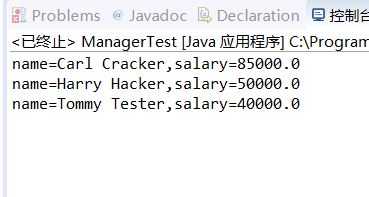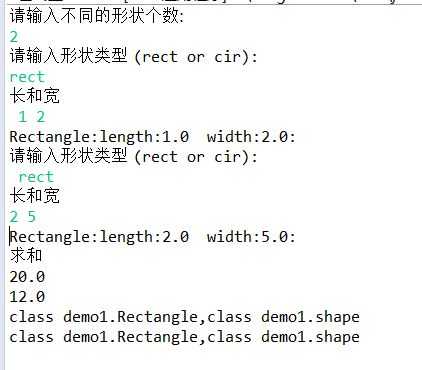李晓菁201771010114《面向对象程序设计(Java)》第六周学习总结
2021-05-15 21:28
标签:ima 结合 objects 分享 generated rgs mil tde 操作 理论部分: 第五章:继承 1.继承用已有类来构建新类的一种机制。 2..继承的特点:具有层次结构,子类继承了父类的域和方法。 3.继承的优点:代码可重用性,父类的域和方法可用于子类,可以轻松定义子类,设计应用程序变得更加简单。 4.继承层次: 实验六 继承定义与使用 实验时间 2018-9-28 1、实验目的与要求 (1) 理解继承的定义; (2) 掌握子类的定义要求 (3) 掌握多态性的概念及用法; (4) 掌握抽象类的定义及用途; (5) 掌握类中4个成员访问权限修饰符的用途; (6) 掌握抽象类的定义方法及用途; (7)掌握Object类的用途及常用API; (8) 掌握ArrayList类的定义方法及用法; (9) 掌握枚举类定义方法及用途。 2、实验内容和步骤 实验1: 导入第5章示例程序,测试并进行代码注释。 测试程序1: ? 在elipse IDE中编辑、调试、运行程序5-1 (教材152页-153页) ; ? 掌握子类的定义及用法; ? 结合程序运行结果,理解并总结OO风格程序构造特点,理解Employee和Manager类的关系子类的用途,并在代码中添加注释。 运行结果: 测试程序2: ? 编辑、编译、调试运行教材PersonTest程序(教材163页-165页); ? 掌握超类的定义及其使用要求; ? 掌握利用超类扩展子类的要求; ? 在程序中相关代码处添加新知识的注释。 运行结果: 测试程序3: ? 编辑、编译、调试运行教材程序5-8、5-9、5-10,结合程序运行结果理解程序(教材174页-177页); ? 掌握Object类的定义及用法; ? 在程序中相关代码处添加新知识的注释。 运行结果: 测试程序4: ? 在elipse IDE中调试运行程序5-11(教材182页),结合程序运行结果理解程序; ? 掌握ArrayList类的定义及用法; ? 在程序中相关代码处添加新知识的注释。 运行结果: 测试程序5: ? 编辑、编译、调试运行程序5-12(教材189页),结合运行结果理解程序; ? 掌握枚举类的定义及用法; ? 在程序中相关代码处添加新知识的注释。 运行结果; 实验2:编程练习1 ? 定义抽象类Shape: 属性:不可变常量double PI,值为3.14; 方法:public double getPerimeter();public double getArea())。 ? 让Rectangle与Circle继承自Shape类。 ? 编写double sumAllArea方法输出形状数组中的面积和和double sumAllPerimeter方法输出形状数组中的周长和。 ? main方法中 1)输入整型值n,然后建立n个不同的形状。如果输入rect,则再输入长和宽。如果输入cir,则再输入半径。 思考sumAllArea和sumAllPerimeter方法放在哪个类中更合适? 输入样例: 3 rect 1 1 rect 2 2 cir 1 输出样例: 18.28 8.14 18.28 8.14 [Rectangle [width=1, length=1], Rectangle [width=2, length=2], Circle [radius=1]] class Rectangle,class Shape class Rectangle,class Shape class Circle,class Shape 实验一代码及结果如下: 主类: 抽象类Shape: circle类: Rectangle类: 运行结果: 实验3: 编程练习2 编制一个程序,将身份证号.txt 中的信息读入到内存中,输入一个身份证号或姓名,查询显示查询对象的姓名、身份证号、年龄、性别和出生地。 程序如下: 封装类如下所示: 运行结果如下: 实验总结:通过本次实验二让我更加明确了封装的概念,以及读取文件的操作,通过实验一让我更进一步的理解了继承的概念,在此次代码注释过程中,我发现了自己的不足之处在于,对有些代码还是不太清楚其语义,以及其含义,上次老师讲授代码的含义时,对我帮助极大,希望老师还可以选择讲一些代码的作用。这样在我自己学习时,就可结合老师的讲授去理解。 李晓菁201771010114《面向对象程序设计(Java)》第六周学习总结 标签:ima 结合 objects 分享 generated rgs mil tde 操作 原文地址:https://www.cnblogs.com/li-xiaojing/p/9725219.htmlpackage inheritance;
/**
* This program demonstrates inheritance.
*
* @version 1.21 2004-02-21
* @author Cay Horstmann
*/
public class ManagerTest {
public static void main(String[] args) {
// construct a Manager object
Manager boss = new Manager("Carl Cracker", 80000, 1987, 12, 15);// 执行完该行之后bonus为0
boss.setBonus(5000);//set调用更改器方法将bonus改为5000
Employee[] staff = new Employee[3];//定义一个Employee类,new后使用构造器方法并将该数组初始化为3。
// fill the staff array with Manager and Employee objects
staff[0] = boss;//boss是Employee类的子类对象。
staff[1] = new Employee("Harry Hacker", 50000, 1989, 10, 1);
staff[2] = new Employee("Tommy Tester", 40000, 1990, 3, 15);
//staff也是Employee类。
// print out information about all Employee objects
for (Employee e : staff)
System.out.println("name=" + e.getName() + ",salary=" + e.getSalary());//使用get调用访问器 方法
}
}
package inheritance;
public class Manager extends Employee
{
private double bonus;
/**
* @param name the employee‘s name
* @param salary the salary
* @param year the hire year
* @param month the hire month
* @param day the hire day
*/
public Manager(String name, double salary, int year, int month, int day)
{
super(name, salary, year, month, day);
bonus = 0;
}
public double getSalary()
{
double baseSalary = super.getSalary();
return baseSalary + bonus;
}
public void setBonus(double b)
{
bonus = b;
}
}
package inheritance;
/**
* This program demonstrates inheritance.
* @version 1.21 2004-02-21
* @author Cay Horstmann
*/
public class ManagerTest
{
public static void main(String[] args)
{
// construct a Manager object
Manager boss = new Manager("Carl Cracker", 80000, 1987, 12, 15);
boss.setBonus(5000);
Employee[] staff = new Employee[3];
// fill the staff array with Manager and Employee objects
staff[0] = boss;
staff[1] = new Employee("Harry Hacker", 50000, 1989, 10, 1);
staff[2] = new Employee("Tommy Tester", 40000, 1990, 3, 15);
// print out information about all Employee objects
for (Employee e : staff)
System.out.println("name=" + e.getName() + ",salary=" + e.getSalary());
}
}

/**
* This program demonstrates abstract classes.
* @version 1.01 2004-02-21
* @author Cay Horstmann
*/
public class PersonTest//主类
{
public static void main(String[] args)
{
Person[] people = new Person[2];
//用Employee类和Student类填充people数组
people[0] = new Employee("Harry Hacker", 50000, 1989, 10, 1);
people[1] = new Student("Maria Morris", "computer science");
//打印出所有person类的名字和其他描述
for (Person p : people)
System.out.println(p.getName() + ", " + p.getDescription());
}
}
public abstract class Person//抽象类:Person
{
public abstract String getDescription();
private String name;//传建一个私有属性
public Person(String name)//构造器
{
this.name = name;
}
public String getName()//访问器
{
return name;
}
}
public class Student extends Person//子类:Student类继承Person类
{
private String major;//创建一个私有属性major
/**
* @param nama the student‘s name
* @param major the student‘s major
*/
public Student(String name, String major)//构造器
{
super(name);//子类直接调用超类中的name属性
this.major = major;
}
public String getDescription()//访问器
{
return "a student majoring in " + major;
}
}
import java.time.*;
public class Employee extends Person//子类:Employee类继承Person类
{
private double salary;
private LocalDate hireDay;
//两个私有属性
public Employee(String name, double salary, int year, int month, int day)//构造器
{
super(name);//子类直接调用超类中的name
this.salary = salary;
hireDay = LocalDate.of(year, month, day);
}
public double getSalary()
{
return salary;
}
public LocalDate getHireDay()
{
return hireDay;
}
public String getDescription()
{
return String.format("an employee with a salary of $%.2f", salary);
}
//访问器
public void raiseSalary(double byPercent)
{
double raise = salary * byPercent / 100;
salary += raise;
}//定义两个局部变量
}

package equals;
/**
* This program demonstrates the equals method.
* @version 1.12 2012-01-26
* @author Cay Horstmann
*/
public class EqualsTest
{
public static void main(String[] args)
{
Employee alice1 = new Employee("Alice Adams", 75000, 1987, 12, 15);
Employee alice2 = alice1;
Employee alice3 = new Employee("Alice Adams", 75000, 1987, 12, 15);
Employee bob = new Employee("Bob Brandson", 50000, 1989, 10, 1);
System.out.println("alice1 == alice2: " + (alice1 == alice2));
System.out.println("alice1 == alice3: " + (alice1 == alice3));
System.out.println("alice1.equals(alice3): " + alice1.equals(alice3));
System.out.println("alice1.equals(bob): " + alice1.equals(bob));
System.out.println("bob.toString(): " + bob);
Manager carl = new Manager("Carl Cracker", 80000, 1987, 12, 15);
Manager boss = new Manager("Carl Cracker", 80000, 1987, 12, 15);
boss.setBonus(5000);
System.out.println("boss.toString(): " + boss);
System.out.println("carl.equals(boss): " + carl.equals(boss));
System.out.println("alice1.hashCode(): " + alice1.hashCode());
System.out.println("alice3.hashCode(): " + alice3.hashCode());
System.out.println("bob.hashCode(): " + bob.hashCode());
System.out.println("carl.hashCode(): " + carl.hashCode());
}
}
package equals;
public class Manager extends Employee
{
private double bonus;
public Manager(String name, double salary, int year, int month, int day)
{
super(name, salary, year, month, day);
bonus = 0;
}
public double getSalary()
{
double baseSalary = super.getSalary();
return baseSalary + bonus;
}
public void setBonus(double bonus)
{
this.bonus = bonus;
}
public boolean equals(Object otherObject)
{
if (!super.equals(otherObject)) return false;
Manager other = (Manager) otherObject;
// 检查这个和其他属于同一个类
return bonus == other.bonus;
}
public int hashCode()
{
return java.util.Objects.hash(super.hashCode(), bonus);
}
public String toString()
{
return super.toString() + "[bonus=" + bonus + "]";
}
}
package equals;
import java.time.*;
import java.util.Objects;
public class Employee
{
private String name;
private double salary;
private LocalDate hireDay;
public Employee(String name, double salary, int year, int month, int day)
{
this.name = name;
this.salary = salary;
hireDay = LocalDate.of(year, month, day);
}
public String getName()
{
return name;
}
public double getSalary()
{
return salary;
}
public LocalDate getHireDay()
{
return hireDay;
}
public void raiseSalary(double byPercent)
{
double raise = salary * byPercent / 100;
salary += raise;
}
public boolean equals(Object otherObject)
{
// 快速检查对象是否相同
// 这里获得一个对象参数,第一个if语句判断两个引用是否是同一个,如果是那么这两个对象肯定相等
if (this == otherObject) return true;
// 如果显式参数为空,则必须返回false
if (otherObject == null) return false;
if (getClass() != otherObject.getClass()) return false;
// 父类引用子类的对象的出现,然后再判断对象的属性是否相同
Employee other = (Employee) otherObject;
// 测试字段是否具有相同的值
return Objects.equals(name, other.name) && salary == other.salary && Objects.equals(hireDay, other.hireDay);
}
public int hashCode()
{
return Objects.hash(name, salary, hireDay);
}
public String toString()
{
return getClass().getName() + "[name=" + name + ",salary=" + salary + ",hireDay=" + hireDay
+ "]";
}
}

package arrayList;
import java.util.*;
/**
* This program demonstrates the ArrayList class.
* @version 1.11 2012-01-26
* @author Cay Horstmann
*/
public class ArrayListTest
{
public static void main(String[] args)
{
// 用三个Employee对象填充staff数组列表
ArrayList
//employee类:
package arrayList;
import java.time.*;
public class Employee
{
private String name;
private double salary;
private LocalDate hireDay;
public Employee(String name, double salary, int year, int month, int day)
{
this.name = name;
this.salary = salary;
hireDay = LocalDate.of(year, month, day);
}
public String getName()
{
return name;
}
public double getSalary()
{
return salary;
}
public LocalDate getHireDay()
{
return hireDay;
}
public void raiseSalary(double byPercent)
{
double raise = salary * byPercent / 100;
salary += raise;
}
}
package enums;
import java.util.*;
/**
* This program demonstrates enumerated types.
* @version 1.0 2004-05-24
* @author Cay Horstmann
*/
public class EnumTest
{
public static void main(String[] args)
{
Scanner in = new Scanner(System.in);
System.out.print("Enter a size: (SMALL, MEDIUM, LARGE, EXTRA_LARGE) ");
String input = in.next().toUpperCase();
Size size = Enum.valueOf(Size.class, input);
System.out.println("size=" + size);
System.out.println("abbreviation=" + size.getAbbreviation());
if (size == Size.EXTRA_LARGE)//判断语句
System.out.println("Good job--you paid attention to the _.");
}
}
enum Size
{
SMALL("S"), MEDIUM("M"), LARGE("L"), EXTRA_LARGE("XL");
private Size(String abbreviation) { this.abbreviation = abbreviation; }
public String getAbbreviation() { return abbreviation; }
private String abbreviation;
}

2) 然后输出所有的形状的周长之和,面积之和。并将所有的形状信息以样例的格式输出。
3) 最后输出每个形状的类型与父类型,使用类似shape.getClass()(获得类型),shape.getClass().getSuperclass()(获得父类型);package demo1;
import java.util.Scanner;
public class Text1 {
public static void main(String[] args) {
// TODO 自动生成的方法存
@SuppressWarnings("resource")
Scanner in = new Scanner(System.in);
String rect = "rect";
String cir = "cir";
System.out.println("请输入不同的形状个数:");
int n = in.nextInt();
shape[] num = new shape[n];
for (int i = 0; i ) {
System.out.println("请输入形状类型 (rect or cir):");
String input = in.next();
if (input.equals(rect)) {
System.out.println("长和宽");
double length = in.nextDouble();
double width = in.nextDouble();
System.out.println("Rectangle[" + "length:" + length + " width:" + width + "]");
num[i] = new Rectangle(width, length);
}
if (input.equals(cir)) {
System.out.println("半径 ");
double radius = in.nextDouble();
System.out.println("Circle[" + "radius:" + radius + "]");
num[i] = new Circle(radius);
}
}
Text1 c = new Text1();
System.out.println("求和");
System.out.println(c.sumAllPerimeter(num));
System.out.println(c.sumAllArea(num));
for (shape s : num) {
System.out.println(s.getClass() + "," + s.getClass().getSuperclass());
}
}
public double sumAllArea(shape score[]) {
double sum = 0;
for (int i = 0; i )
sum += score[i].getArea();
return sum;
}
public double sumAllPerimeter(shape score[]) {
double sum = 0;
for (int i = 0; i )
sum += score[i].getPerimeter();
return sum;
}
}
public abstract class shape {
double PI = 3.14;
abstract double getPerimeter();
abstract double getArea();
}
public class Circle extends shape {
private double radius;
public Circle(double radius) {
}
public double getPerimeter()
{
double Perimeter=2*PI*radius;
return Perimeter;
}
public double getArea()
{
double Area=PI*radius*radius;
return Area;
}
}
public class Rectangle extends shape {
private double length;
private double width;
public Rectangle(double width, double length) {
this.length = length;
this.width = width;
}
public double getPerimeter() {
double Perimeter=2*(length + width);
return Perimeter ;
}
public double getArea() {
double Area= length * width;
return Area;
}
}

package demo2;
import java.io.BufferedReader;
import java.io.File;
import java.io.FileInputStream;
import java.io.FileNotFoundException;
import java.io.IOException;
import java.io.InputStreamReader;
import java.util.ArrayList;
import java.util.Scanner;
public class Demo2 {
private static ArrayList
public class Student {
private String name;
private String id;
private String number;
private String sex;
private String year;
private String province;
public String getName() {
return name;
}
public void setName(String name) {
this.name = name;
}
public String getId() {
return id;
}
public void setId(String id) {
this.id = id;
}
public String getNumber() {
// TODO 自动生成的方法存根
return number;
}
public void setNumber(String number) {
this.number = number;
}
public String getSex() {
// TODO 自动生成的方法存根
return sex;
}
public void setSex(String sex) {
// TODO 自动生成的方法存根
this.sex = sex;
}
public String getYear() {
// TODO 自动生成的方法存根
return year;
}
public void setYear(String year) {
// TODO 自动生成的方法存根
this.year = year;
}
public String getProvince() {
// TODO 自动生成的方法存根
return province;
}
public void setProvince(String province) {
// TODO 自动生成的方法存根
this.province = province;
}
}

文章标题:李晓菁201771010114《面向对象程序设计(Java)》第六周学习总结
文章链接:http://soscw.com/essay/85955.html